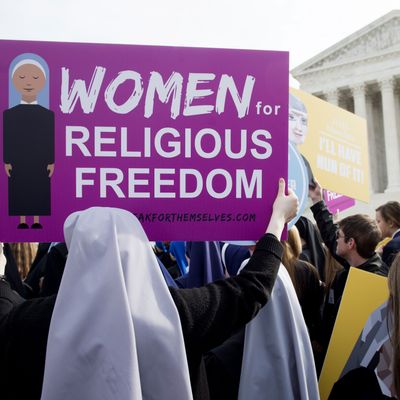
Something that is largely missing from this year’s presidential campaign that was a reasonably big deal in 2012 is the “religious liberty” issue — the demand that people of faith be insulated from compliance with non-discrimination laws that they claim violate their consciences.
As the 2012 general election heated up, the U.S. Conference of Catholic Bishops announced a whole series of events devoted to alarms over alleged threats to religious liberty — especially the Obama administration’s “contraception-coverage mandate” as applied to church-affiliated colleges and universities and other non-profit institutions. Conservative Evangelical leaders were already fully on board. Republican presidential nominee Mitt Romney climbed onto the bandwagon quickly as well, particularly in a speech at Liberty University designed to overcome the last vestiges of Evangelical fears of his own LDS faith. The Obama administration tried to tamp down the furor over the contraception-coverage mandate with special accommodations for religiously affiliated institutions, but drew the line at growing demands that religiously motivated businesses or individuals deserved protection from compliance of the law as well (a point of view that was partially validated by the U.S. Supreme Court in the Hobby Lobby case.)
In other words, the “religious liberty” issue became in 2012 a key point of solidarity between conservative Christians of every background and the Republican Party.
Four years later, a lot has changed. For one thing, “religious liberty” as a legal claim became associated less with opposition to contraception and abortion, and more with an increasingly unpopular last-ditch opposition to LGBT rights in general and same-sex marriage in particular. The “martyrs” of alleged violations of religious liberty were no longer nuns providing health care and social services who didn’t want to be complicit in what they considered abortion services (typically forms of contraception the Catholic Church viewed as abortifacients), but the rather ridiculous figures of “bakers of conscience” who wouldn’t provide wedding cakeds for same-sex ceremonies. Defenders of “religious liberty” laws at the state level were regularly routed in the court of public opinion — most notably when Indiana Gov. Mike Pence was forced by public and business pressure to modify one such law.
So while conservative religious organizations and their political arms haven’t changed their minds about a religious right to discriminate, they are not as loud and proud about it as in 2012. And you can see a new climate in public-opinion surveys.
According to a new poll from the Public Religion Research Institute: “By a roughly two to one margin, Americans oppose rather than favor allowing a small business owner in their state to refuse to provide products or services to gay or lesbian people if doing so violates their religious beliefs (63 percent vs. 30 percent, respectively).” That’s exactly the same as the margin by which Catholics now oppose such policies. And 68 percent of white mainline Protestants and black Protestants oppose religion-based discrimination rights for businesses. And even among white evangelical Protestants, support for such laws is down to a spare 49–45 margin.
Lagging support for legalized discrimination is being reflected in the presidential contest as well. In Donald Trump’s much-publicized outreach efforts with conservative Evangelicals, he has focused on the rather insipid cultural cause of restoring public Christmas greetings (surely the most embarrassing claim of victimization in the history of martyrdom), and the very specific “religious liberty” demand, mainly of interest to Evangelical clergy, of allowing electioneering and political-candidate endorsements from the pulpit without risking tax exemptions. The broad-based “religious liberty” crusade of 2012 seems to have receded. Maybe Trump has learned from his running mate that it’s a trap.






























